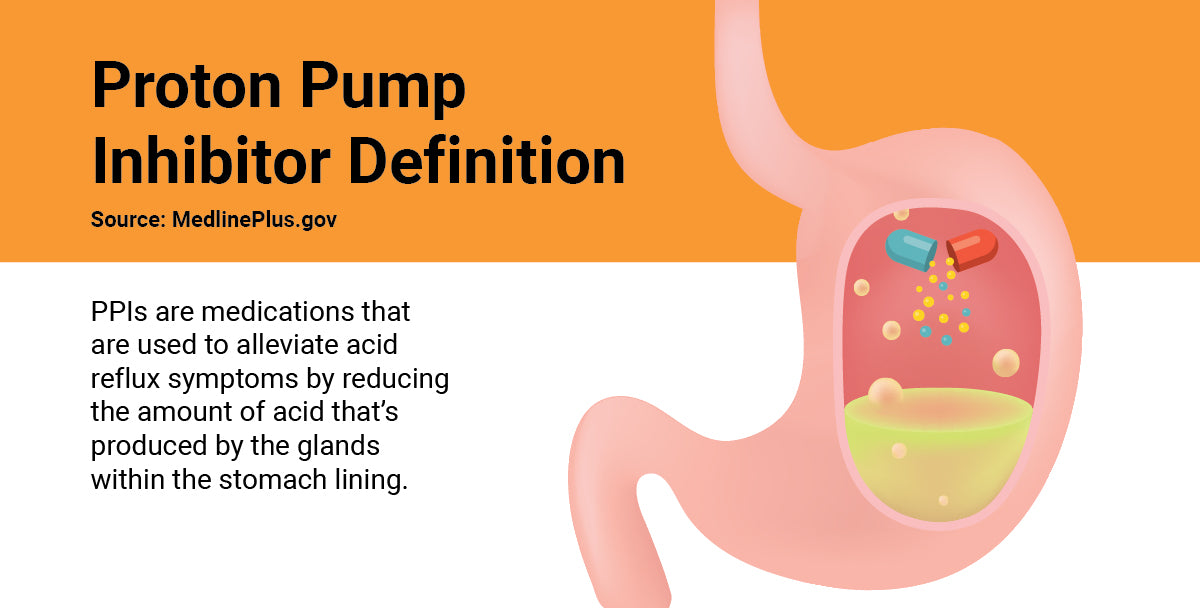
Related Product

Reflux Relief System
$249.99 USD
Say goodbye to nighttime Acid Reflux & GERD pain without sacrificing comfort.
What Are the Side Effects of Proton Pump Inhibitors (PPIs)?
Share
Proton Pump Inhibitors, or PPIs, are pills doctors prescribe when your stomach acid acts like it’s auditioning for a volcano role.
They work by turning down the acid “tap” in your stomach. Super handy if you’re battling heartburn, GERD, or ulcers.
Millions of Americans now take GERD and acid reflux medications daily. Drugs like Prilosec (omeprazole), Dexilant, and Nexium are available over-the-counter or by prescription.
In fact, PPIs, sometimes called the “purple pill,” are taken by over 15 million Americans each day to treat painful heartburn symptoms.
Like any medication, PPIs have their benefits and drawbacks. While they can offer quick relief, long-term use has raised health concerns.
Stay tuned as we address “what a proton pump inhibitor is, how it works, the side effects you should know about, whether PPIs are truly safe, and what other options you can try for acid reflux.”
What is a Proton Pump Inhibitor (PPI)?
What are proton pump inhibitors? What is PPI medicine? In simple terms, proton pump inhibitors are a class of medications that reduce how much acid your stomach makes. By blocking acid secretion at the source, PPIs provide relief for people suffering from reflux-related conditions. The PPI medical abbreviation stands for proton pump inhibitor.
Key Facts About PPI Medicine
|
Characteristics |
Details |
|
Onset of action |
Takes 1-4 days for full effect |
|
Best Taken |
30-60 minutes before the first meal of the day |
|
Available as |
Prescription and over-the-counter (OTC) |
|
Treatment durations |
OTC versions recommended for 14 days or less |
Available since the 1980s, proton pump inhibitors (PPIs) are widely prescribed. They help treat the symptoms of gastroesophageal reflux disease (GERD) because they stop the production of stomach acid. No acid, no reflux. Problem solved.
But over time, concerns have grown around the risks of PPI medicine when used for longer than the recommended duration.

How PPIs Work
PPIs, also known by the PPI medical abbreviation (proton pump inhibitors), work by blocking specific stomach cells from "pumping" acid into the stomach. According to the journal, PPIs can lessen or prevent heartburn and associated symptoms when taken 30 to 60 minutes before a meal. However, they work better when taken over time than when taken as needed.
What Do PPIs Treat?
Proton pump inhibitors treat the following conditions:
-
Acid reflux
-
Gastroesophageal reflux disease (GERD)
-
Duodenal or stomach (gastric) ulcers
-
Damage to the lower esophagus as a result of acid reflux
-
Pill-induced esophagitis (a condition that can occur when a pill is stuck in your throat)
What are the Different Types of PPIs
If you’ve ever wondered what is PPI medicine, here are some of the common types and brands you might come across: There are several different types and brands of PPIs:
-
Omeprazole (Prilosec), also available over-the-counter (without a prescription)
-
Esomeprazole (Nexium), also available over-the-counter (without a prescription)
-
Lansoprazole (Prevacid), also available over-the-counter (without a prescription)
-
Rabeprazole (AcipHex)
-
Pantoprazole (Protonix)
-
Dexlansoprazole (Dexilant)
-
Zegerid (omeprazole with sodium bicarbonate), also available over-the-counter (without a prescription)
Common Side Effects of PPIs
Like any other medication, PPI side effects range from mild to severe. Some of the more common, less extreme side effects associated with PPIs include:
-
Headache
-
Diarrhea
-
Constipation
-
Nausea
-
Itching
If you are breastfeeding or pregnant, talk to your provider before taking these medicines.
Serious Long-Term PPI Side Effects
Research over the past decade has revealed that the long-term use of proton pump inhibitors carries more severe risks. These PPI side effects are associated with chronic use, often beyond the recommended 14-day course for OTC versions.
According to Harvard Medical School, some of the serious risks of PPI that cause side effects may include:

-
Chronic Kidney Disease: Some studies suggest a correlation between long-term PPI use and a decline in kidney function.
-
Bone Fractures: Reduced stomach acid may impair calcium absorption, potentially weakening bones and increasing the risk of fractures, particularly in the hip, wrist, and spine.
-
Nutrient Deficiencies: Stomach acid is essential for absorbing certain nutrients. Long-term PPI use can lead to deficiencies in Vitamin B12, iron, and magnesium.
-
Increased Infection Risk: Stomach acid acts as a barrier against pathogens. Suppressing it can increase susceptibility to infections like C. difficile diarrhea and community-acquired pneumonia.
-
Dementia Risk: Some research has pointed to a potential link, though more studies are needed to establish a definitive cause.
FDA Warnings on Long-Term PPI Usage
FDA has issued several warnings and hundreds of studies have been published showing an association between long-term PPI usage.
If you look at the dosing instructions for the most common PPI medications, you will see that the instructions are clear. Only use these medications 3x a year for no more than 14 days. That’s it.
Have you been taking your PPI medications for longer than recommended by the FDA? You might consider adjusting your treatment plan, or better yet, consider what alternative treatments are available.
When Should You Consult Your Doctor?
The U.S. National Library of Medicine says patients who are experiencing PPI side effects should contact their provider if:
-
You are having side effects from these medicines
-
You are having other unusual symptoms
-
Your symptoms are not improving

Are There Safer Alternative Treatments to PPI?
Yes, there is a safer alternative for PPI. In light of serious medication side effects, patients nationwide are seeking alternative solutions to treat their symptoms. Over 100,000 people have found great relief at night with the MedCline Reflux Relief System. Always consult your physician before making any changes to your treatment.
This sleep positioning medical device creates (and maintains) the ideal position for patients at night to naturally relieve their GERD symptoms, including:
-
Heartburn
-
Regurgitation
-
Lesser-known symptoms of ‘silent reflux’ such as chronic cough and nasal congestion.
Clinical studies have shown that the MedCline acid reflux pillow reduces esophageal acid exposure by 87% more effectively than a traditional bed wedge.
Wrapping Up
Understanding “what is a proton pump inhibitor” and the risks associated with long-term use is essential for anyone managing acid reflux. While PPIs can be effective for short-term relief, ongoing use carries potential dangers. If you’re considering treatment, ask your doctor about safe usage guidelines, look for alternatives, and stay informed about the latest research.
Sometimes, relief doesn’t have to come from a pill; it can come from a smarter, safer lifestyle approach.
Want to learn more about how the MedCline Reflux Relief System can help address your reflux symptoms? Get in touch with our Sleep Specialists. Call us on 800-610-1607 or send an email to support@medcline.com at any time. You can also chat with a Sleep Specialist directly through the MedCline website.
Related Product

Reflux Relief System
$249.99 USD
Say goodbye to nighttime Acid Reflux & GERD pain without sacrificing comfort.

